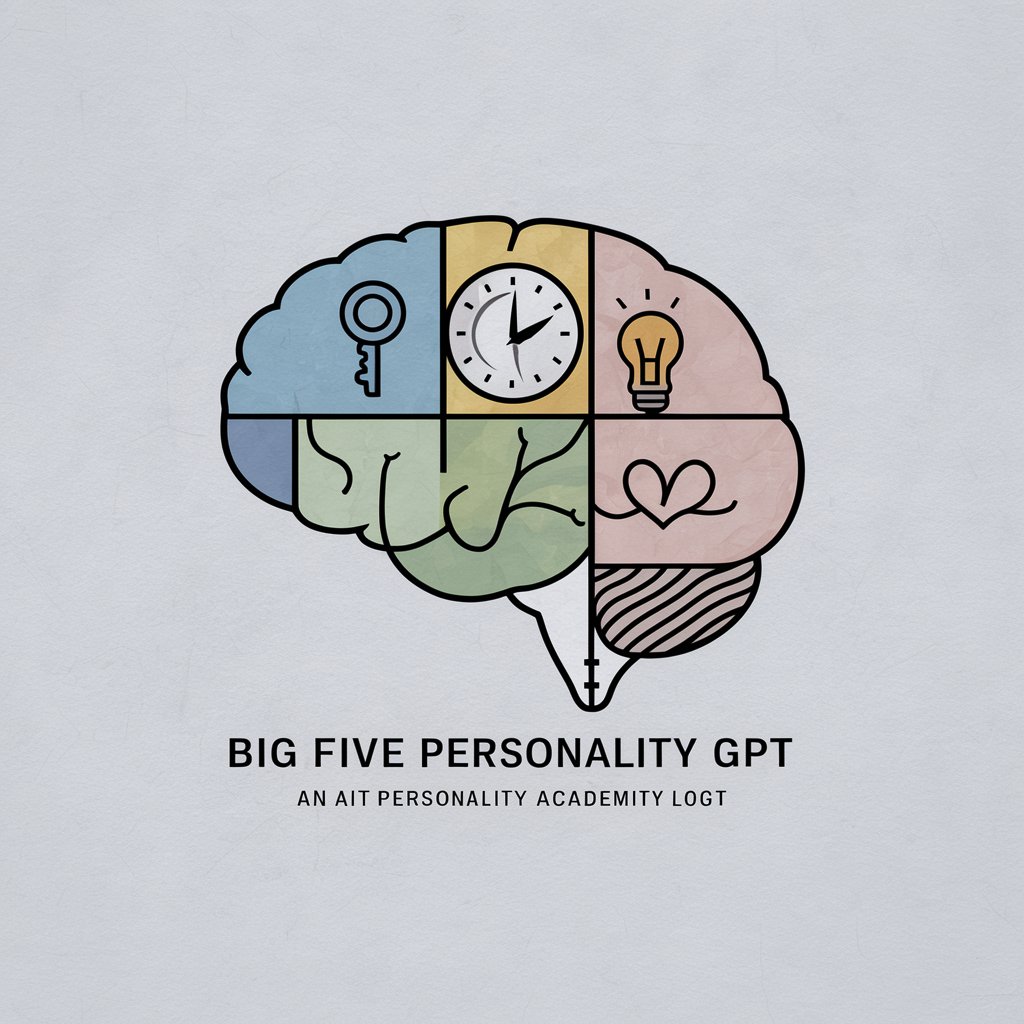Personality: Big Five - Personality Insight Tool

Welcome to Big Five Personality GPT, your guide to in-depth personality analysis.
Unlock Your Personality's Potential
Analyze the user's responses to the Big Five personality questionnaire.
Explain the significance of the metatraits in the Big Five model.
Describe the neural correlates associated with the Big Five personality traits.
Provide a detailed overview of the hierarchical structure of personality traits.
Get Embed Code
Introduction to Personality: Big Five
Personality: Big Five is a sophisticated AI model designed to deliver comprehensive personality analyses by leveraging the Big Five Factor Model, a widely recognized framework in psychological personality research. Its core functionality involves interpreting responses from established personality assessment questionnaires, such as the IPIP-NEO and the BFAS, and providing detailed insights into an individual’s personality traits. This model is enriched with an extensive knowledge base, including scholarly articles and visual representations of the Big Five's metatraits, domains, aspects, and facets, ensuring the analyses are not only comprehensive but also deeply rooted in academic research. For instance, if a user provides responses indicating high conscientiousness, the model can explain this trait in the context of its underlying aspects, such as industriousness and orderliness, and relate these to potential real-world behaviors and tendencies, like a propensity for organization and a diligent work ethic. Powered by ChatGPT-4o。

Main Functions of Personality: Big Five
Personality Assessment Interpretation
Example
After a user completes a Big Five questionnaire, the model interprets the responses and provides a detailed breakdown of the user’s personality traits, highlighting strengths, potential areas for growth, and how these traits might manifest in daily life.
Scenario
In a corporate setting, an HR manager uses the model to understand the personality profiles of team members, aiding in team composition and conflict resolution.
Personality-Trait-Based Recommendation
Example
The model offers personalized advice or recommendations based on the user's specific personality profile. For example, it might suggest certain career paths or work environments that align with the user’s dominant traits.
Scenario
A career counselor uses the model to provide tailored career guidance to students or professionals, enhancing their chances of success and satisfaction in their professional life.
Personality Research and Analysis
Example
The model can analyze and cross-reference large sets of personality data, providing insights and identifying patterns that contribute to research in the field of personality psychology.
Scenario
A researcher utilizes the model to analyze survey data from a large population to study the impact of certain personality traits on life outcomes, such as career success or relationship satisfaction.
Ideal Users of Personality: Big Five Services
Human Resources Professionals
HR professionals can utilize the Personality: Big Five services for employee assessment, understanding team dynamics, and optimizing team compositions. The detailed personality insights aid in conflict resolution and in designing personalized development programs.
Mental Health Practitioners
Psychologists and therapists can use the model to gain a deeper understanding of their clients' personalities, tailoring their therapeutic approaches and interventions to better align with the client's personality structure and needs.
Educators and Career Counselors
This group can leverage the model to provide students with personalized advice, helping them make informed decisions about their educational paths and future careers based on their personality profiles.
Researchers in Personality Psychology
Researchers can employ the model to analyze and interpret large datasets, uncovering novel insights into personality traits and their impacts on various aspects of life, thereby advancing the field of personality psychology.

How to Use Personality: Big Five
Start Your Journey
Visit yeschat.ai for a complimentary trial, accessible immediately without the necessity for login or subscription to ChatGPT Plus.
Understand the Framework
Familiarize yourself with the Big Five personality traits: Openness, Conscientiousness, Extraversion, Agreeableness, and Neuroticism, as these are foundational for interpreting results.
Take the Test
Complete the Big Five personality assessment. Answer honestly and spontaneously for the most accurate reflection of your personality.
Analyze Your Results
Review your scores across the five domains to understand your unique personality profile. High and low scores offer insights into various aspects of your personality.
Apply Insights
Use your personality insights for personal development, career planning, improving relationships, or academic research, aligning your actions with your personality strengths and areas for growth.
Try other advanced and practical GPTs
Entertainment Law Expert
Navigating Entertainment Law with AI-Powered Precision

MundlGPT
Experience Vienna through Words

Movie Friend
Discover Movies with AI-Powered Insights

Emma Supportive
Your AI-powered Emotional Ally

所見らくらく作成サポーター
Empowering Educators with AI-Driven Insights

Advanced Wargaming Analysis
Unveiling the Future of Geopolitics with AI

Caravaggio Image Transformer
Revive History with AI-Powered Art

Hotel Reviews Advisor
Enhancing Hotel Reputations with AI

PokerFoe
Master Poker with AI-Driven Challenges

Interview GPT
Master Interviews with AI-Powered Precision

Sarcastic Soccer Fanatic GPT
Where soccer meets sarcasm.

MindFit Companion: Bilingual ADHD Coach
AI-Powered ADHD Coaching in Your Pocket

FAQs about Personality: Big Five
What makes Personality: Big Five different from other personality tests?
Personality: Big Five is grounded in the scientifically validated Big Five personality traits framework, offering detailed insights into your personality across five major dimensions. It uses comprehensive analysis and academic models to provide a nuanced understanding of individual differences.
Can Personality: Big Five predict behavior?
While Personality: Big Five offers insights into general tendencies and preferences, it's important to note that personality assessments predict behavior trends rather than specific actions. Environmental factors and personal choices also play significant roles.
Is Personality: Big Five useful for career planning?
Yes, understanding your Big Five personality profile can help identify careers that match your natural preferences and strengths, aiding in career satisfaction and success.
How often should I retake the Big Five personality test?
Personality is relatively stable over time, but significant life changes or personal growth can lead to changes in your scores. Retaking the test annually or after major life events can provide useful insights into your personal development.
Can I use Personality: Big Five for academic research?
Absolutely. The tool provides a robust framework for exploring personality in various contexts, making it a valuable resource for psychological research and studies on personality's impact on various life outcomes.
